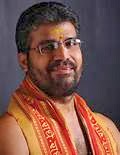Historicity & Andal's Poetry :
Andal is now one of the best loved poet-saints of the Tamils. Pious tradition reckons her to be the veritable descent of Bhumi Devi (Mother Earth) in bodily form to show humanity the way to His lotus feet. She is present in all Sri Vaishnava temples, in India and elsewhere, next to her Lord, as she always desired.
Historicity
The hagiography of Andal as presented above is undoubtedly historically true in most important respects. Today, the tulasi garden in which she was found is preserved in Srivilliputtur. Vishnucitta's house, adjacent to Lord Vishnu's temple, has been converted into a temple in honor of Andal and contains the well in which she admired her reflection while wearing the Lord's garlands.
Most of all, however, Andal is remembered for her poetry, in which she often strikes autobiographical notes about her love for her Lord. She describes herself as a young girl, still not fully mature, pining away for Him. She beseeches her friends, the god of love, and even animals for help in her quest to attain Him. Finally, she describes her good fortune of being the daughter of Vishnucitta, the best of the devout, who lives in Srivilliputtur and adores the Lord.
Andal's Poetry
Andal composed two works in her short life. Both are in Tamil and are unique in their literary, philosophical, religious, and artistic content. Her contribution is even more remarkable considering that she was a teenage girl when she composed these poems, at a time when there is no other record of Tamil women composing poetry [2]. Far from being the prattlings of a youngster, Andal's verses display a literary and religious maturity far beyond her years.
Her first work is the Tiruppavai, a poem of thirty verses in which Andal imagines herself to be a cowherd girl during the incarnation of Lord Krishna. She yearns to serve Him and achieve happiness not just in this birth, but for all eternity, and describes the religious vow (pavai) that she and her fellow cowgirls will take for this purpose.
Continues....





Comments